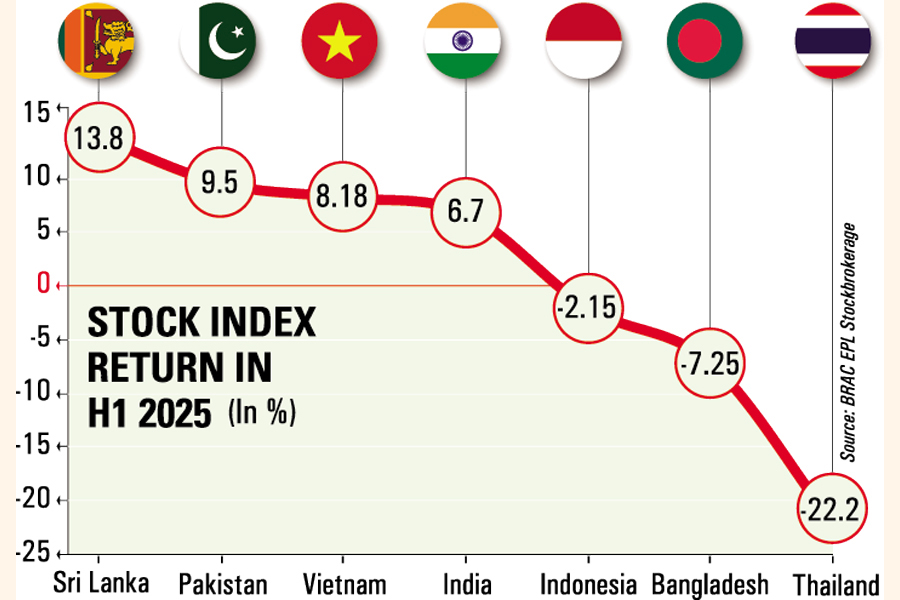
Published :
Updated :

Bangladesh's stock market was the second worst performer among Asian frontier markets in the first half of 2025, with the benchmark index sliding and no new listing.
Sri Lanka showed the best performance as its equity index had a 13.9 percent return, while Thailand is at the bottom of the ranking with its index losing more than 22 per cent.
Factors such as high interest rates, declining corporate profitability, ongoing economic and political uncertainties and the legacy of negative equity have diminished investor confidence in Bangladesh.
Global aspects, notably - US tariff imposition and India-Pakistan and Iran-Israel conflicts -- also impacted Bangladesh's market sentiment.
A glimmer of hope ensued soon after the political changeover in August last year only to be doused as political uncertainties have loomed centring on the next national elections.
The DSEX, the benchmark free-float weighted market index, lost 378 points or 7.25 per cent to 4,838 by June 30, while the market cap shed 8.1 per cent during the time under review.
The blue-chip DS30 index, a group of 30 prominent companies, also plunged by 124 points to 1,816 while the DSES Index, which represents Shariah-based companies, fell 108 points to 1,061.
Average daily turnover of the prime bourse, which means the value of shares transacted in a day, tumbled to Tk 3.84 billion, a whopping 39 per cent decline year-on-year.
While inflation is gradually cooling and the forex market shows stability following the introduction of the market-driven regime, interest rate remains high and non-performing loans have gone through the roof, said BRAC EPL Stockbrokerage in an analysis.
In the depressed market, stock investors even have not had any chance to make some profits from initial public offerings (IPO); there was not a single IPO in the last one year in the main market or in the SME market, something not seen in decades.
The new commission is focused on bringing stability and discipline in the capital market, hence priority on bringing IPOs to the market has taken a back seat, said BRAC EPL.
Md Saiful Islam, president of the DSE Brokers Association of Bangladesh (DBA), said the main problem of the stock market is that the market does not have enough investable equity.
Along with ensuring transparency and accountability, companies with a good track record should be listed to restore investor confidence.
"We are trying our best. But the confidence of investors is the most important thing for the market to turn around," added Mr Islam.
Making the secondary market vibrant is one of the key tasks to create scope for new companies to raise funds through IPOs.
The new commission has, however, already formed a committee and held meetings with major local and multinational companies to address the matter of listing.
Meanwhile, the heavyweight banking sector lost 8.4 per cent during the time due to the uncovering of financial scars of at least 10 banks.
The non-performing loans in the banking sector soared to a record Tk 4.20 trillion at the end of March this year, surging 130 per cent year-on-year as the interim government forced banks to show their true financial health after the political changeover last year.
The Bangladesh Bank has also tightened its grip on troubled non-bank financial institutions. As per a BB plan, 20 non-bank financial institutions may merge or be liquidated.
Overall negative sentiment weighed on stocks of good-performing local and multinational companies too.
Except for Marico and Heidelberg Materials, stock prices of all multinational companies fell in the six months through June. Reckitt Benckiser is the top loser, having its market value erased by 24 per cent.
Meanwhile, global investment research firm Morgan Stanley Capital International (MSCI) has made no changes for the Bangladesh market in its May 2025 review. The market is still subjected to "special treatment" (no changes in the upcoming index reviews).
Only 24 DSE companies are in the FTSE Frontier Index as of May this year.
Market outlook in H2
Earlier, Asian Frontier Capital (AFC), a pioneering global fund management company, predicted a bullish outlook for Bangladesh's stock market towards the second half of this year, riding on an economic turnaround.
A rise in foreign exchange reserves after the release of International Monetary Fund (IMF) loans offers hope for a potential economic recovery.
The country's gross forex reserves increased to $30.5 billion on Thursday, hitting two-year high following the release of fourth and fifth tranches of loans from the IMF's $4.7-billion lending package.
babulfexpress@gmail.com


 For all latest news, follow The Financial Express Google News channel.
For all latest news, follow The Financial Express Google News channel.